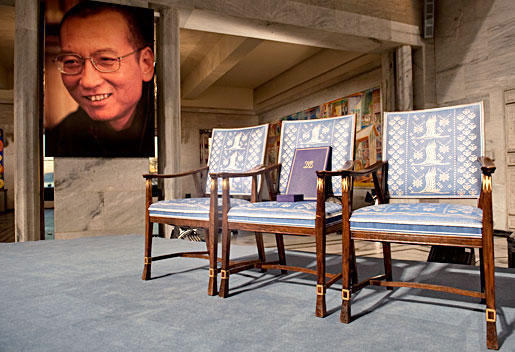
Copyright © The Nobel Foundation 2010
Beijing, China | AFP | At a small park outside the Beijing home of late Chinese Nobel laureate Liu Xiaobo, security officers sat around a stone table surrounded by shrubbery, scrutinising everyone who neared the gate they guarded.
More than a week after the Nobel Peace Prize winner succumbed to liver cancer in custody, four agents stood watch on the stoop of the apartment where his widow, the poet Liu Xia, has largely been kept under house arrest since 2010.
Their presence contradicts official claims last weekend that Liu Xia, 56, is “free”.
She appeared in a government-released video on July 15 showing her husband’s sea burial in the coastal city of Dalian, but close friends have been unable to reach her and believe that she is under police control in southern Yunnan province.
But the medley of uniformed and plainclothes officers outside her home on Friday were undeterred in their surveillance — even if they may have been guarding an empty apartment.
“Where are you going?” a man wearing a “special duty” uniform asked two middle-aged women who approached.
“We live here,” one of them retorted, as if accustomed to the question.
On the other side of the gate, a uniformed officer sat in a chair parked outside the entrance to Liu Xia’s apartment.
Three other men sat inside the dark entranceway, including one eating a bowl of noodles.
They all stood up when an AFP reporter approached.
“What are you doing here? You don’t live in this neighbourhood,” said the uniformed officer, gesturing for the reporter to leave.
Outside the gate, security agents talked among themselves as they waited for their lunch break.
“Yesterday there were five to six reporters who came,” a middle-aged man said to the group. He wore a black T-shirt, the preferred attire of plainclothes agents.
“Those foreigners just come here to make trouble. They want to take photos of everything. Lunch time is rush hour for them, then things die down after 7 p.m.”
Earlier that day, a four-person foreign television crew had come through one of the complex’s main gates.
They were soon surrounded by officers in both black and green uniforms.
“Do you know who Liu Xia is?” one of the journalists asked a guard, who barked back: “Never have I met anyone as rude as you!”
At around the same time, an AFP photographer was held by police who asked him to delete three photos he had taken of the apartment exterior.
He did not comply, and was shortly released.
– Business as usual –
All was calm on the riverfront boardwalk that Liu Xia’s apartment overlooked, as joggers, bikers and fishermen alike appeared to be unaware of the commotion on the other side of the gate.
The Chinese government has erased virtually all mentions of Liu Xiaobo, a 1989 Tiananmen Square protest veteran, from the internet and domestic media.
Liu was sentenced to 11 years in prison in 2009 for “subversion” after co-writing Charter 08, a petition calling for democratic reforms in the Communist Party-ruled country.
The following year, he became the first Chinese person to be awarded the Nobel Peace Prize, but was not allowed to attend the ceremony in Oslo.
“I don’t know who (Liu Xia or Liu Xiaobo) is,” said a young woman who lived in the apartment complex.
“Many government employees live in this compound. The guards are here for their safety,” she said.
An elderly man collecting trash on the boardwalk said he believed it was the building’s proximity to Beijing’s main thoroughfare that brought increased security.
“And I think (Chinese President) Xi Jinping was here?”
 The Independent Uganda: You get the Truth we Pay the Price
The Independent Uganda: You get the Truth we Pay the Price



